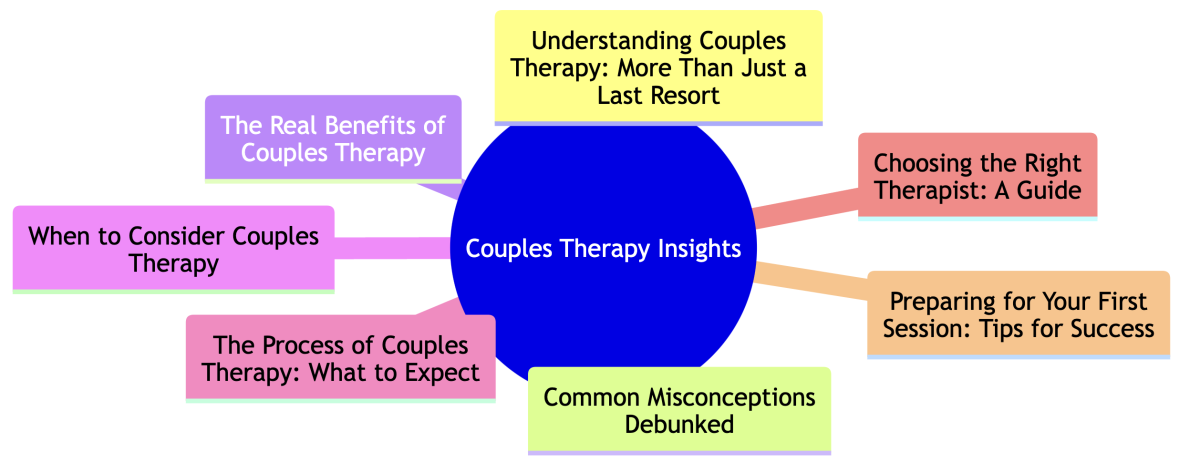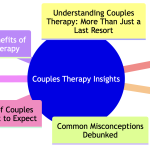Introduction: Dispelling Myths and Embracing Growth
Couples therapy, often shrouded in myths and misconceptions, is a powerful resource for relationships at various stages. Far from a mere crisis intervention, it's a process toward understanding, growth, and deeper connection. This type of therapy is not just about resolving conflicts - it's about fostering a profound understanding and building a resilient bond between partners. It's a proactive step, a sign of strength and commitment, not an admission of defeat or despair.
Key Takeaways
- Proactive Approach: Couples therapy is beneficial at any relationship stage, not just during crises.
- Personalized Journey: Therapy is tailored to each couple's unique dynamics and needs.
- Strength, Not Weakness: Seeking therapy is a testament to the commitment and resilience in a relationship.
- Beyond Conflict Resolution: Therapy focuses on building communication, understanding, and connection.
- Long-Term Benefits: Engaging in therapy can lead to lasting improvements in relationship quality.

Understanding Couples Therapy: More Than Just a Last Resort
Couples therapy transcends the common misconception of being the final attempt to salvage a failing relationship. It's a strategic, thoughtful approach to nurturing and strengthening the bond between partners. This therapy adapts to each relationship's unique challenges and stages, offering a customized blend of support, guidance, and skill-building. It's a space where couples learn to navigate their journey together, equipped with better communication tools, understanding, and mutual respect.
Stages of Relationship and Therapy Intervention
- Early Relationship: Focus on establishing healthy communication patterns and understanding expectations.
- Pre-Marital/Commitment: Address potential issues and lay a strong foundation for future challenges.
- Post-Marital/Long-Term: Navigate life changes, maintain connection, and rejuvenate the relationship.
- During Crises: Provide support and strategies to manage and resolve conflicts effectively.
- Growth and Enhancement: Continuously improve relationship dynamics and deepen emotional connection.
Common Misconceptions Debunked
Myth 1: Therapy Indicates a Failing Relationship
The belief that couples therapy signals a failing relationship is a widespread misconception. In reality, it's a proactive measure, reflecting a couple's commitment to nurturing and strengthening their bond. Therapy is not a distress signal but a strategic choice for growth. It's about partners taking a collaborative step towards understanding each other better, resolving underlying issues, and fortifying their relationship against future challenges.
Myth 2: Therapy is Only for Married Couples
Couples therapy is often mistakenly thought to be exclusive to married partners. However, it benefits any couple, regardless of their marital status. Whether dating, engaged, or in a long-term partnership, therapy offers valuable tools for improving communication, deepening understanding, and resolving conflicts. It's a resource for all couples aiming to enhance their relationship's health and longevity.
Myth 3: Therapists Take Sides
A common fear is that therapists will take sides, favoring one partner over the other. This is far from the truth. Professional therapists maintain neutrality, creating a balanced and unbiased environment. Their role is to facilitate open communication, helping each partner express and understand the other's perspective. The focus is on the relationship's health, not on assigning blame or taking sides.
Myth 4: Immediate Results Expected
Many enter therapy expecting quick fixes and immediate results. However, couples therapy is a journey, not a sprint. It requires time, patience, and commitment from both partners. The process involves unraveling complex issues and developing new communication patterns, which can't happen overnight. Lasting change is gradual and is built upon consistent effort and mutual understanding within the therapy sessions.
The Real Benefits of Couples Therapy
Couples therapy offers many benefits, extending far beyond mere conflict resolution. It's a transformative process that fosters improved communication, deeper understanding, and emotional growth.
Through therapy, couples learn to articulate their needs and feelings effectively, paving the way for a more empathetic and supportive relationship. It's not just about solving problems; it's about building a foundation of trust and mutual respect.
Therapists equip couples with tools to navigate their relationship's complexities, ensuring they're prepared for future challenges. This proactive approach leads to a more fulfilling and resilient partnership.
Another significant benefit is the enhancement of conflict resolution skills. Couples learn to approach disagreements constructively, transforming potential conflicts into opportunities for growth.
Therapy provides a safe space to explore sensitive issues, guiding couples to understand the root causes of their disagreements. This understanding leads to healthier interactions, where conflicts become less about winning and more about finding mutual solutions. The skills gained in therapy extend beyond the sessions, contributing to a lasting, positive impact on the relationship.
When to Consider Couples Therapy
Couples therapy isn't reserved for times of crisis - it's beneficial at various stages of a relationship. It's a proactive tool for maintaining a healthy partnership. Consider therapy when communication starts to falter, when misunderstandings become frequent, or when you feel disconnected from your partner.
It's also valuable when navigating life transitions, such as moving in together, marriage, or welcoming a child. Therapy can help address these changes constructively, ensuring they strengthen rather than strain your relationship.
- Frequent Misunderstandings: When you often find yourselves at cross purposes.
- Feeling Disconnected: If there's a growing emotional distance between you.
- Major Life Changes: Such as marriage, parenthood, or career shifts.
- Recurring Conflicts: When the same issues keep resurfacing without resolution.
- Trust Issues: If there's been a breach of trust or difficulty in building trust.
The Process of Couples Therapy: What to Expect
Embarking on couples therapy is a journey of exploration and growth. Initially, it may seem daunting, but understanding the process can ease apprehensions. The first step is often an assessment, where the therapist gets to know each partner and the dynamics of the relationship. This phase is crucial for setting goals and tailoring the therapy to your specific needs.
- Initial Assessment: Understanding each partner's perspective and relationship dynamics.
- Goal Setting: Collaboratively determining what you want to achieve in therapy.
- Skill Building: Learning and practicing communication and conflict resolution skills.
- Exploring Underlying Issues: Delving into the root causes of conflicts and challenges.
- Implementing Strategies: Applying new skills and strategies in real-life scenarios.
- Progress Evaluation: Regularly assessing progress and adjusting the therapy plan as needed.
- Consolidation: Reinforcing gains and preparing for the conclusion of therapy.
This structured approach ensures that therapy is a comprehensive, enlightening experience, leading to lasting positive changes in your relationship.
Choosing the Right Therapist: A Guide
Qualifications and Experience
Selecting a therapist with the right qualifications and experience is crucial. Look for a licensed professional with specialized training in couples therapy. Their experience should align with your specific needs. A well-reviewed therapist with a history of dealing with similar issues can offer more targeted and effective guidance.
Therapy Approaches and Techniques
Different therapists use various approaches and techniques. Some may focus on communication strategies, while others might employ behavioral therapy. Understanding their methods is important to ensure they resonate with your expectations and beliefs. A therapist's approach can significantly influence the therapy's effectiveness.
Comfort and Compatibility
The therapeutic relationship is built on trust and comfort. Ensure you feel at ease with the therapist's style and personality. Compatibility is key to a successful therapy experience. If you don't feel understood or comfortable, it's okay to look for another therapist who better suits your needs.
Preparing for Your First Session: Tips for Success
Entering therapy can be daunting, but preparation can ease this process. Be open and honest about your feelings and expectations. It's a time for discovery and understanding, not judgment. Remember, the first session is as much about you evaluating the therapist as it is about them helping you.
Do's and Don'ts in Initial Therapy Sessions
- Do: Be open and honest with your therapist.
- Don't: Hold back information due to fear of judgment.
- Do: Set clear goals for what you want to achieve.
- Don't: Expect immediate solutions; therapy is a process.
- Do: Be prepared to reflect on your feelings and behaviors.
- Don't: Blame your partner; focus on self-awareness and growth.
Conclusion: Embracing Therapy for a Stronger Relationship
Couples therapy offers a unique opportunity for partners to deepen their understanding of each other, strengthen their bond, and navigate the complexities of their relationship with expert guidance. It's not just about resolving conflicts; it's about building a foundation of trust, communication, and mutual respect that can transform the very nature of a relationship.
Turning the spotlight to David Tzall, a seasoned psychologist based in Brooklyn, we find a professional who truly embodies the essence of effective and empathetic couples therapy.
David's approach is distinctly human-centered, emphasizing the importance of a strong therapeutic connection. His sessions, whether in-person in Brooklyn or virtual therapy in NYC, are marked by a deep sense of empathy and engagement, ensuring that every couple feels heard, validated, and understood. His commitment to understanding each individual's personal narratives and behavior patterns enables him to guide couples toward making value-aligned decisions and positive, long-lasting changes in their relationships.
With David Tzall, couples seeking therapy in Brooklyn are not just receiving guidance but are embarking on a transformative journey of self-discovery and mutual understanding. For those seeking the best Couples Therapy Brooklyn has to offer, David Tzall represents not just a choice but a pathway to a deeper, more fulfilling relationship.




